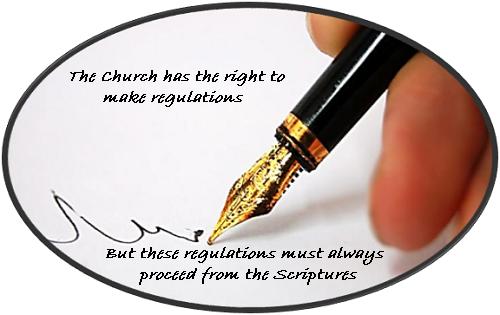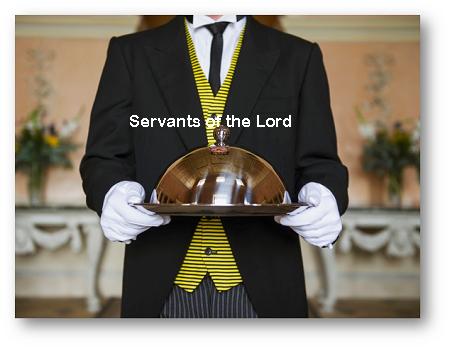Church Polity and Civil Law
Church Polity and Civil Law

Spiritual Body⤒🔗
When we speak about Church Polity, we should always bear in mind that the church of Jesus Christ is a spiritual body. This is especially important when we discuss the connection between Church Polity and Civil Law. In the Netherlands a debate was held about this topic. Last year Mr. J.R. Krol, LI.M. who studied law and who is a crown prosecutor published an essay entitled "A Reconnaissance around the Church Order."1 In that essay he regretted the fact that the General Synod of Kampen, 1975, did not appoint one or more lawyers to the committee for the revision of the Church Order. Mr. Krol says,
The Reformed Churches need a thoroughly revised Church Order. For that purpose a committee of lawyers and theologians who are interested in matters of Church Polity must be established within our churches. In this committee there is then the possibility for both to discuss this revision together.2
A response to this essay came from Dr. W.G. de Vries in a few articles entitled "Church Order and Jurisprudence."3 He first reminded his readers of the fact that the most recent revision of the Church Order dated from the General Synod of Groningen-Zuid, 1978, about ten years ago, and then dealt extensively with the difference which exists between Church Polity and Civil Law. He especially pointed to the fact that in many countries Civil Law is based on the pagan Roman law. Also the Roman Catholic Church bases its Canon Law on this Roman law of nature. In this respect, the Canons of Dort, III/IV, Article 4 can be quoted:
To be sure, there is left in man after the fall, some light of nature, whereby he retains some notions about God, about natural things, and about the difference between what is honourable and shameful, and shows some regard for virtue and outward order. But he is so far from arriving at the saving knowledge of God and true conversion through this light of nature that he does not even use it properly in natural and civil matters.
Dr. W.G. de Vries continued by referring to lectures of the late Prof. P.M. ten Hoor, who was professor of Theology in Grand Rapids for many years after 1900. Ten Hoor said,
The naturalistic view of life denies the divine origin of law. It is derived from man, but not from a single man, because that should lead to individualism and should make law impossible. No, it is derived from society or the community. The state is here the source of law, also of ecclesiastical law.4
I read practically the same in Ten Hoor's Theological Encyclopedia, his introduction on theology, dating from the year 1918. In this work Ten Hoor wrote about the theology of ecclesiology, "The Church has the right to make regulations. But these regulations must always proceed from the Scriptures, and no elements may be brought in which are in conflict with the principles which are embodied in Reformed Church Polity."5 In other words, there is a great difference between Church and State in this respect. "The true status of the Church is only to be known from the Scripture, and that status is in agreement with the spiritual body of Christ." "It belongs to the task of Church Polity to give an exposition about the relation between Church and State. Emphasis must be put on the Church's independence from the State, and also upon the fact that the civil government has to recognize the Church and her right of property. In this respect it may not be forgotten to point out from history that whenever the government exercised its power in and over the Church, this caused incalculable damage to the Church."6

Luther and Calvin←⤒🔗
In the law of nature, as followed by the Roman Catholic Canon Law, the Church is treading in the footsteps of the State. However, the Reformers of the 16th century rejected this idea completely. As for Luther, on December 10, 1520, Luther burned not only the papal bull with which the Pope had condemned and excommunicated him, but also the whole papal law, as stated in the Corpus Juris Canonici, the whole collection of Roman ecclesiastical laws. It is no wonder that lawyers of that time opposed Luther's act. Unfortunately, after Luther the lawyers won the battle, and the result was that the churches again became dependent on the State in several countries, especially in Germany.
As for Calvin, it is well-known that the Reformer of Geneva had a lifelong struggle with the State regarding the rights of the church. Calvin stressed very much the spiritual character of Church Polity. He often used the term disciplina, not only for what we call church discipline, but also for the care for the souls. In this matter not only the office-bearers are involved, but also all the members of the congregation. Calvin never argued in a formal, let alone, a formalistic way, so that, for instance, because of faults in the procedure a whole matter of "disciplina" could be blocked. He always stressed the matter of the care for the souls. The specific nature of Church Polity is then that discipline is to be executed. "It is something else than the law of nature, civil law, law of societies or whatever." It is interesting to quote Calvin's introduction on church discipline:
Necessity and Nature of Church Discipline
The discipline of the church, the discussion of which we have deferred to this place, must be treated briefly, that we may thereafter pass to the remaining topics. Discipline depends for the most part upon the power of the keys and upon spiritual jurisdiction. To understand it better, let us divide the church into two chief orders: clergy and people. I call by the usual name "clergy" those who perform the public ministry in the church. We shall first speak of common discipline, to which all ought to submit; then we shall come to the clergy, who, besides the common discipline, have their own.But because some persons, in their hatred of discipline, recoil from its very name, let them understand this: if no society, indeed, no house which has even a small family can be kept in proper condition without discipline, it is much more necessary in the church, whose condition should be as ordered as possible. Accordingly, as the saving doctrine of Christ is the soul of the church, so does discipline serve as its sinews, through which the members of the body hold together, each in its own place. Therefore, all who desire to remove discipline or to hinder its restoration – whether they do this deliberately or out of ignorance – are surely contributing to the ultimate dissolution of the church. For what will happen if each is allowed to do what he pleases? Yet that would happen, if to the preaching of doctrine there were not added private admonitions, corrections, and other aids of the sort that sustain doctrine and do not let it remain idle. Therefore, discipline is like a bridle to restrain and tame those who rage against the doctrine of Christ; or like a spur to arouse those of little inclination; and also sometimes like a father's rod to chastise mildly and with the gentleness of Christ's Spirit those who have more seriously lapsed. When, therefore, we discern frightful devastation beginning to threaten the church because there is no concern and no means of restraining the people, necessity itself cries out that a remedy is needed. Now, this is the sole remedy that Christ has enjoined and the one that has always been used among the godly. (Italics added, K.D.)7
Calvin speaks about a spiritual jurisdiction. For him the ecclesiastical law has its own nature. That has to do with the "Spiritual order which our Lord has taught us in His Word," according to what we confess in Article 30 of the Belgic Confession.8
Service←⤒🔗
In this way Reformed Church Polity was set up as a spiritual order. It was stated already in Emden, 1571, and confirmed at Dort, 1618/19, in the presbyterial Church Order. "The church is the subordinate of its Personal Head, the living and present Jesus Christ. The presbyterial church government is then, according to the principles of the Church Order of Dort, the ministration of the one supremacy of the one Head, Jesus Christ, in His church as one body."9

There is one keyword in the whole matter of church government, namely, service. The officebearers, and also the members of the church have to serve Jesus Christ, the only King of the church, and they have to serve each other. This is what Christ Himself taught His disciples and also the church of all ages: "The kings of the Gentiles exercise lordship over them; and those in authority over them are called benefactors. But not so with you; rather let the greatest among you become as the youngest, and the leader as one who serves (Luke 22:24 ff.). Christ Himself gave the great example: "…I am among you as one who serves" (verse 27).
No Church Polity?←⤒🔗
Church Polity (and also the Church Order) has a spiritual character, because the church of God is a spiritual body. Not the light of nature, but the light of God's Word must guide the church, also in this respect.
But there are people who say that actually church and law form an impossible combination and that the church must therefore get rid of the whole idea of Church Polity.
A representative of this idea was Dr. Rudolph Sohm, who was a Lutheran professor of law in several places, but by the end of the 19th and the beginning of the 20th century taught at Leipzig in Germany. He said: If then the church has a spiritual character, why was Church Polity introduced? The term is actually contradictory. The date that it was introduced was the date the church fell into sin. Dr. Sohm had three arguments in support of this view:
-
Law as such is formal, but in Christ's church the matter upon which everything depends is whether or not there is agreement with God's Word and will.
-
Law as such implies the obligation that everyone has to bow before it. It also compels those who are unwilling; but in Christ's church free obedience, which arises from love and which does not even have the slightest idea of compulsion, alone is important.
-
Law as such belongs to the world, to what is destined for earthly life; but the church of Christ is spiritual and the complete structure of the church is in accordance with it.10
Already in 1894, at the occasion of the transfer of his rectorate at the Free University of Amsterdam, the "father" of the Church Polity of the Doleantie, Dr. F.L. Rutgers, disproved these arguments.
Rutgers' response can be summarized by saying that he argued in the first place that law in its original quality is not in conflict with the nature of the church. In the beginning there was a perfect harmony between church and law. The visible church on earth consists of believers who want to live on the basis of the Word of God alone. These believers are not perfect, but afflicted with many failures, just like all mankind. The brokenness of life made Church Polity indispensable for the wellbeing of the earthly church. The peculiarity of Church Polity is that it is explicitly subordinate to the nature of the church. Although Church Polity as such is not in conflict with the nature of the church, and it is even impossible for the church to exist without it, nevertheless Sohm's criticism on several hierarchical and collegial systems of Church Polity is of value. If Church Polity loses its serving function, it becomes a disturbing factor which deforms and disorders the church (italics added, K.D.).11
Principles of the Scriptures for Church Polity←⤒🔗
Later, in the struggle of the church around the "vrijmaking" Dr. S. Greijdanus also argued in the line of Dr. F.L. Rutgers: Church Polity is possible, indeed, but we have to bear in mind that Christ alone is the Head of the church. The church is the Lord's particular possession. We have to regulate all our ecclesiastical actions according to the revealed will of God. Christ is the chief Shepherd. Men can only be shepherds if they remain in Him. But, all ecclesiastical action of officebearers or assemblies should be tested by the Word of God. The church is a spiritual unity under Christ the Head. Apart from the apostles, the Lord did not give general, regional, provincial, national or ecumenical office-bearers. The local church has received office-bearers from God Himself, not by common consent. They are servants of the Lord, and they may serve also God's people.12

Dr. S. Greijdanus elaborated on some principles, especially with respect to the relation between consistories and major assemblies, and he wrote at the end,
The Lord knows the desire for hierarchy and for tyranny, also among those who are His, also under religious attire, also among the guides of the Church, even among His apostles. But He condemned it and He forbade His disciples to yield to it. 'But you are not to be called rabbi, for you have one teacher, and you are all brethren'.Matthew 23:8
No Legalism←⤒🔗
To stress the spiritual character of Church Polity also means that we may not go the way of legalism. Dr. W.G. de Vries pointed especially to that danger in a second article in De Reformatie about "Church Order and Jurisprudence." I quote, "…when we would receive in our Church Order all kinds of watertight formulations, with exact description of rights and competences and exceptions, then the danger of legalism comes up, according to my opinion."13
In connection with this, he quotes Dr. F.L. Rutgers again, who wrote in another brochure about the federation of the churches in the beginning of the 17th century in the struggle with the Armenians:
The federation of Churches was upheld by maintaining the common confession of the Churches; but it was thrown out of action, where it was necessary to preserve the pure confession; it was broken, where deviation from the confession had already undone it.14
Juridical View?←⤒🔗
In a third article in De Reformatie, Dr. W.G. de Vries paid special attention to what he called a juridical view on the Church Order. He points to a danger in this respect. He wrote that the Church Order is there "in order to protect the confession. Therefore, the Church Order does not need to deliver all kinds of watertight descriptions. After all, also the Reformed confession does not know juridical systematics…"15
Dr. de Vries added that it is precisely an advantage that neither the confession nor the Church Order delivers juridical views. He gave the example of question and answer 74 of the Heidelberg Catechism.
Lord's Day 27 says that the infants are grafted into the Christian church 'by baptism.' One who reasons in a juridical way would say: 'so, before baptism they were not members of the church.' However, the baptismal questions to the parents demands from them the confession that our children are sanctified in Christ and thus as members of His Church ought to be baptized. So, baptism seals that what was present already. Besides, Lord's Day 27 starts with the statement that 'infants as well as adults belong to God's covenant and congregation' and that therefore they should be baptized too. No juridical systematics, but warm words of the covenant concerning membership of the Church.16

I would like to add to that that the same happens in connection with the membership of adults who are baptized. The third question which is to be answered by the adult is in the second part: "Believing in Him, do you confess that you receive the remission of sins in His blood and that by the power of the Holy Spirit you have become a member of Jesus Christ and His Church?" He who reasons in a juridical way would say: apparently the person concerned was already a member of the church; hence the church must in this case be the invisible church. That is a reasoning just the other way around than in the case of baptism of infants. I even once heard someone build upon this matter a whole theory about the church. But again, we hear here warm words of God's covenant about the whole matter of membership of the church. The brother or sister who is to be baptized as an adult is not considered in a formal, legalistic way, but is considered as belonging to Christ's church. The consistory had contact with the brother or sister concerned and allowed him or her to make profession of faith and to be baptized.
Our conclusion is that we must not read the Church Order or the liturgical forms in a juridical, but in a pastoral way, and that we must not mix up Church Polity and Civil Law. If we would do that, it would become a very dangerous situation for the church.

Add new comment